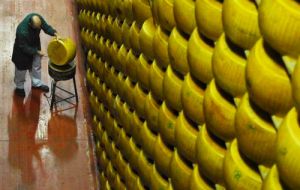MercoPress. South Atlantic News Agency
US-Canada and EU agree to end ‘beef war’; Brussels grants 48.000 tons quota
 Peace will mean a boost for the EU cheese industry among others
Peace will mean a boost for the EU cheese industry among others European Parliament has backed a deal that will increase EU imports of beef from the US and Canada and help European food exporters. A row over growth hormones used on North American cattle ranches led to a trade war lasting more than 20 years.
The new deal sets an annual EU quota of 48.200 tonnes for high-quality North American beef from cattle that have not been treated with growth hormones. North America will lift import tariffs on a range of European farm produce.
An EU ban on hormone-treated meat and meat products remains in place, even though the World Trade Organization (WTO) ruled in 1997 that it was illegal. The EU ban, dating back to 1988, was based on concerns about the addition of six hormones to more than 90% of American beef.
But now, US farmers are no longer using the hormones, according to Robert Sturdy MEP, a UK Conservative and Vice-President of the European Parliament's Trade Committee.
Mr Sturdy, a farmer himself, said the trade deal would be especially important for the European dairy sector, “which has had a difficult time”.
Unique cheeses like Stilton and Roquefort, protected by EU country of origin rules, are popular among Americans yet “basically it has been impossible to export these specialist products”, he told the BBC.
He described the beef deal as “a first tentative step to getting better trade relations with the US and Canada”. “Now is the time to open up markets, with food prices going up and shortages across the world,” he added.
Meanwhile, the EU is urging the US to lift a 15-year-old ban on imports of EU beef. It was imposed because of US concerns about mad-cow disease (Bovine Spongiform Encephalopathy, or BSE).
Last week a US Agriculture department agency recommended that the ban be lifted.
The EU Agriculture Commissioner, Dacian Ciolos, says the ban breaks the World Organization for Animal Health (OIE) rules, which categorise both the US and EU as “controlled risk”.
The US beef deal backed by the European Parliament was signed by EU foreign policy chief Baroness Ashton and the US government in May 2009.
The parliament's Agriculture Committee says its impact on the EU beef market “should be small” because the hormone-free North American beef corresponds to only 0.36% of the EU total beef and veal market.
In May 2011 the US agreed to suspend all of its retaliatory sanctions on EU produce. The high US tariffs, slapped on produce such as pork, chocolate, cheeses, jams and fresh truffles, have cost EU exporters more than 250m dollars.
According to the agriculture committee, Italy will gain the most from the US lifting of sanctions (more than 99m), followed by Poland (25m), Greece and the Republic of Ireland (24m each).
“I hope this will lead to a definitive resolution of the dispute on hormone-treated beef in the WTO,” Commissioner Ciolos said.
The new quota for US and Canadian beef will take effect by August. Of the total 48.200 tons Canada will account for 3.200 tons




Top Comments
Disclaimer & comment rulesCommenting for this story is now closed.
If you have a Facebook account, become a fan and comment on our Facebook Page!